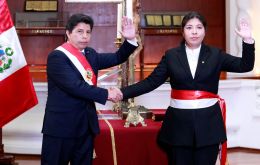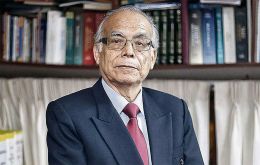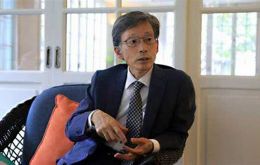MercoPress. South Atlantic News Agency
Politics
-
Saturday, November 26th 2022 - 09:59 UTC
Castillo appoints new Peruvian Prime Minister

Culture Minister Betssy Chávez Chino was chosen by Peru's President Pedro Castillo Terrones to become the country's new Prime Minister (President of the Council of Ministers) following Aíbal Torres' resignation Thursday after Congress “refused” to approve a motion of confidence.
-
Saturday, November 26th 2022 - 09:51 UTC
Guarantors of Colombia-ELN peace talks ratified

Negotiators in the Colombian peace process involving the government of President Gustavo Petro and remnants of the National Liberation Army (ELN) guerrillas Friday agreed in Caracas to ratify Cuba, Norway, and Venezuela as guarantor countries in the talks.
-
Friday, November 25th 2022 - 08:43 UTC
Mexican fans pull Falklands card to mock Argentina supporters in Qatar

Argentine and Mexican fans did not get along very well in Qatar, particularly after provocative chants underlining that ”in the Malvinas (Falklands) they speak English.”
-
Friday, November 25th 2022 - 08:39 UTC
Peru's Prime Minister Torres resigns

Anibal Torres submitted his letter of resignation late Thursday as president of the Council of Ministers (also referred to as Prime Minister) after eight months on the post following Congress' decision not to support him in a motion of confidence voting.
-
Friday, November 25th 2022 - 08:31 UTC
IMF unveils guidelines for Paraguay to unblock foreign financing

The Executive Board of the International Monetary Fund (IMF) has approved this week a technical two-year support program for Paraguay regarding macroeconomic policies.
-
Friday, November 25th 2022 - 08:19 UTC
Argentina: Milei and Bullrich share common values ahead of 2023 elections

Argentine Liberal Deputy Javier Milei admitted he would gladly face PRO Chairwoman (and Presidential hopeful) Patricia Bullrich in next year's primary elections and if he loses he would agree to serve as Minister of Economy under her.
-
Friday, November 25th 2022 - 08:11 UTC
Energy agreement between Argentina and Brazil extended

Argentina and Brazil agreed to extend the current Memorandum of Energy Exchange until 2025, it was reported Thursday. The document, which provides for the exchange of electric power and natural gas between both countries, was about to expire. As per its new wording, the agreement is to be automatically renewed every four years.
-
Friday, November 25th 2022 - 08:04 UTC
Brazil off to a good start in Qatar

Brazil might be on course for their sixth football World Cup title, or at least the fans believe so after a convincing 2-0 victory over Serbia in the second Group G match played in Qatar Thursday.
-
Thursday, November 24th 2022 - 18:43 UTC
Uruguay draw 0-0 with South Korea in Qatar

Uruguay hit the frame twice but, in the end, the South American squad had to settle for a goalless draw in their 2022 World Cup Group H opening game Thursday.
-
Thursday, November 24th 2022 - 13:07 UTC
Scotland will not give up and targets a 'de facto independence referendum' next general election

“A tough pill to swallow,” admitted Scottish First Minister Nicola Sturgeon on Wednesday saying the Scottish National Party, SNP, respected the unanimous ruling of the UK Supreme Court that Scotland does not have the power to hold a referendum.
